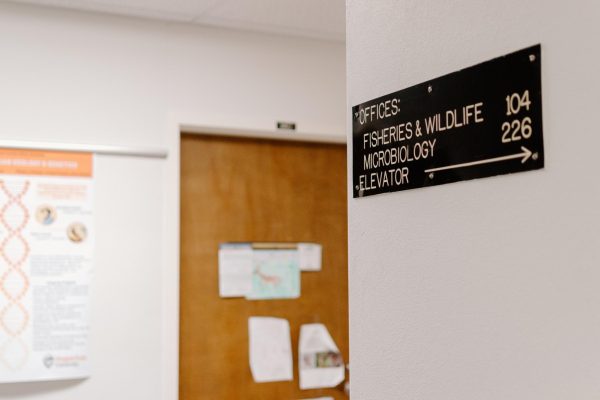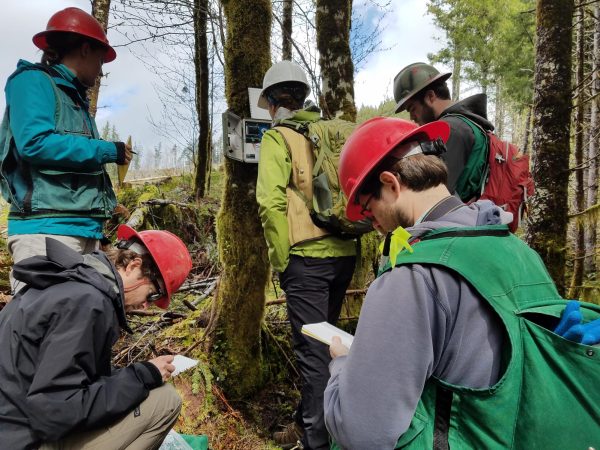Governor declares a state of emergency for homelessness
Andrew May (he/him) who moved to Corvallis in the summer of 2013 with his former wife, children and in-laws at the time, sits on a cement wall while speaking about homelessness on Jan. 25. As of Jan. 11, Tina Kotek has signed off on a state of emergency in regards to various counties in Oregon. However, this state of emergency does not currently apply to Benton County.
February 7, 2023
Governor Tina Kotek declared a homelessness state of emergency in multiple Oregon counties on Jan. 10, following her signing of three executive orders to address the issue.
Though Benton County was not listed as a region that was considered in a state of emergency under Executive Order No. 23-02, the two other executive orders are aimed to reduce sheltered and unsheltered homelessness statewide, by prioritizing the issue and proposing a $130 million investment for housing production.
For Executive Order No. 23-02, it aims to address for homelessness in areas such as Portland Metro and Lane County, which have experienced at least a 50% increase in unsheltered homelessness between 2017 and 2022, according to the State of Oregon’s official website.
For Benton County and Corvallis, Executive Orders No. 23-03 and 23-04 may allow easier access to available funds that would be used to combat homelessness, or houselessness, said Patrick Rollens, public information officer for the city of Corvallis.
“A lot of different pots of money that can be used to address different components of houselessness have different reporting requirements or have more narrow applications,” Rollens said.
According to Rollens a state of emergency can loosen up some of those restrictions and enable that money to be deployed more creatively.
Though Rollens is excited to see exactly how the executive orders may help Corvallis and Benton County, entities such as the Home, Opportunity, Planning and Equity Advisory Board are already combating homelessness, as it is a major issue in the Corvallis community, Rollens said.
“Here in Corvallis, we’ve been working on these issues of houselessness for a really long time, both the city, as well as Benton County, as well as all of our local service providers,” Rollens said. “So, the announcement from the governor is welcome news, but it’s… catching up to some of the perspectives and actions that Corvallis is already taking.”
In particular, the HOPE Advisory Board is a partnership between the city of Corvallis and Benton County aimed to address policy solutions for homelessness, Rollens said.
“(HOPE) is a cross-municipality advisory group that reviews a lot of the long term policies that are in place in the city and county, like land use laws, zoning, housing, funding opportunities — a lot of the structural issues that may have gotten us into this challenging situation,” Rollens said.
Kailee Olson and a team of representatives of HOPE fully endorse Kotek’s recent declaration of a state of emergency for homelessness.
“Benton County’s Coordinated Homeless Response Office is thrilled to see State leadership offer intentional commitment to addressing the homelessness crisis in Oregon,” HOPE representatives said. “Governor Kotek’s three executive orders demonstrate the diversity of needs to address housing and homelessness.”
The HOPE representatives appreciate that Kotek is prioritizing homelessness despite Benton County not being a region that is considered in a state of emergency. Though, the representatives echo Rollens’ sentiment in adding that the city of Corvallis is already working to combat homelessness.
“We have been working to expand the system’s capacity significantly over the past couple of years, but the challenges are also expanding quickly,” HOPE representatives said. “We continue to work hard with local homeless service providers and community partners to help those in our community who are most vulnerable.”
Although Andrew May, who has been homeless since August 2022, uses some of the resources available to the homeless community in Corvallis – refilling his propane tank on Thursdays at select locations around the city, for example – he refuses to return to the Corvallis Men’s Shelter.
“I tried staying at the shelter for two weeks… It was very jailhouse-feeling,” May said.
Though May is skeptical about whether the money available to the city of Corvallis and Benton County for homelessness is all going to places it should be or not, he said that these funds should prioritize mental health in the homeless community.
Both Rollens and the HOPE representatives said that Benton County was given $1 million in July 2022, when it – in partnership with the City of Corvallis and Community Services Consortium – was selected as part of a state pilot program to support a Coordinated Homeless Response System in the area.
“We are currently in the strategic planning phase of the program and are engaging with community partners to support a sustainable system to move people out of homelessness,” HOPE representatives said.
Rollens, though, is more skeptical on the timeline of this matter. According to him, despite receiving a million dollars in funding from the Oregon Legislature to be specifically used for increasing shelter in Corvallis, no direct actions have been taken yet.
“I think we have some ideas of areas that could be funded, but it just sort of illustrates how challenging it is to try to push money out the door to combat issues of houselessness,” Rollens said.
Though the HOPE representatives are not sure exactly how Benton County will be directly affected by the executive orders, their hope is increased funding and a coordinated effort in Oregon to address this issue.
“Homelessness is a systemic issue that needs to be addressed at all levels of government,” HOPE representatives said. “State and federal prioritization of funding and resources to support a coordinated homelessness response will help us meet the needs of our community.”
























































































































